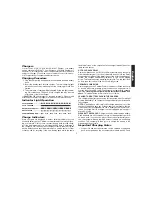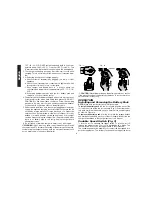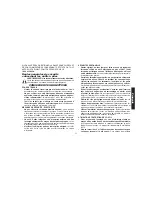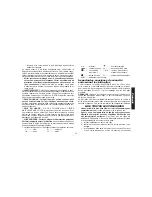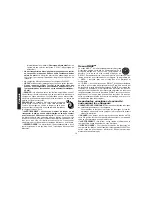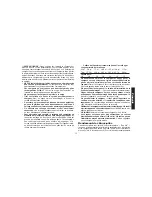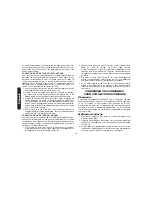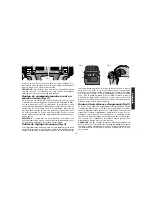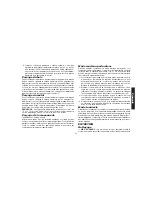
6
English
75°F (18°- 24°C). DO NOT charge the battery pack in an air tem-
perature below +40°F(+4.5°C), or above +105°F (+40.5°C). This
is important and will prevent serious damage to the battery pack.
2. The charger and battery pack may become warm to touch while
charging. This is a normal condition, and does not indicate a prob-
lem.
3. If the battery pack does not charge properly:
a. Check current at receptacle by plugging in a lamp or other
appliance
b. Check to see if receptacle is connected to a light switch which
turns power off when you turn out the lights.
c. Move charger and battery pack to a location where the
surrounding air temperature is approximately 65°F - 75°F (18°-
24°C).
d. If charging problems persist, take the tool, battery pack and
charger to your local service center.
4. The battery pack should be recharged when it fails to produce suf-
ficient power on jobs which were easily done previously. DO NOT
CONTINUE to use under these conditions. Follow the charging
procedure. You may also charge a partially used pack whenever
you desire with no adverse affect on the battery pack.
5. Under certain conditions, with the charger plugged into the power
supply, the exposed charging contacts inside the charger can be
shorted by foreign material. Foreign materials of a conductive
nature such as, but not limited to, steel wool, aluminum foil, or any
buildup of metallic particles should be kept away from charger
cavities. Always unplug the charger from the power supply when
there is no battery pack in the cavity. Unplug charger before
attempting to clean.
6. Do not freeze or immerse charger in water or any other liquid.
WARNING: Don't allow any liquid to get inside charger. Electric
shock may result. To facilitate the cooling of the battery pack after use,
avoid placing the charger or battery pack in a warm environment such
as in a metal shed, or an uninsulated trailer.
CAUTION: Never attempt to open the battery pack for any reason.
If the plastic housing of the battery pack breaks or cracks, return to a
service center for recycling.
OPERATION
Installing and Removing the Battery Pack
NOTE: Make sure your battery pack is fully charged.
To install the battery pack into the tool handle, align the base of the
tool with the notch inside the tool’s handle (Fig. 1) and slide the bat-
tery pack firmly into the handle until you hear the lock snap into place
as shown in Figure 1A.
To remove the battery pack from the tool, press the release buttons
and firmly pull the battery pack out of the tool handle. Insert it into the
charger as described in the charger section of this manual.
Variable Speed Switch (Fig. 2)
To turn the tool on, squeeze the trigger switch. To turn the tool off,
release the trigger switch. Your tool is equipped with a brake. The
chuck will stop as soon as the trigger switch is fully released.
The variable speed switch enables you to select the best speed for a
particular application. The farther you squeeze the trigger, the faster
FIG. 1
FIG. 1A








